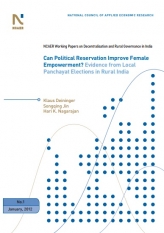Can Political Reservation Improve Female Empowerment? Evidence from Local Panchayat Elections in Rural India
Hari K. Nagarajan
Klaus Deininger
Songqing Jin
January 2012
Reservations enjoy great popularity to overcome deep-rooted inequality. However, in part due to a short horizon of analyses, evidence on the impact of reservations and the mechanisms through which they may work remains ambiguous. Nationally representative village- and household level data from India for the last 3 Panchayat periods allow us to explore dynamic effects of female reservation on subjective and objective quality of public service delivery, political participation, and willingness to contribute to public goods. We find little impact on perceived quality of service provision but a clear link to higher and more effective political participation that then results in greater willingness to contribute to public goods. Contrary to the temporary nature of the first, the latter effects persist even once reservation has lapsed suggesting that conceptualising the policy in such a framework offers a promising avenue for analysis.
Human Development and Data Innovation







